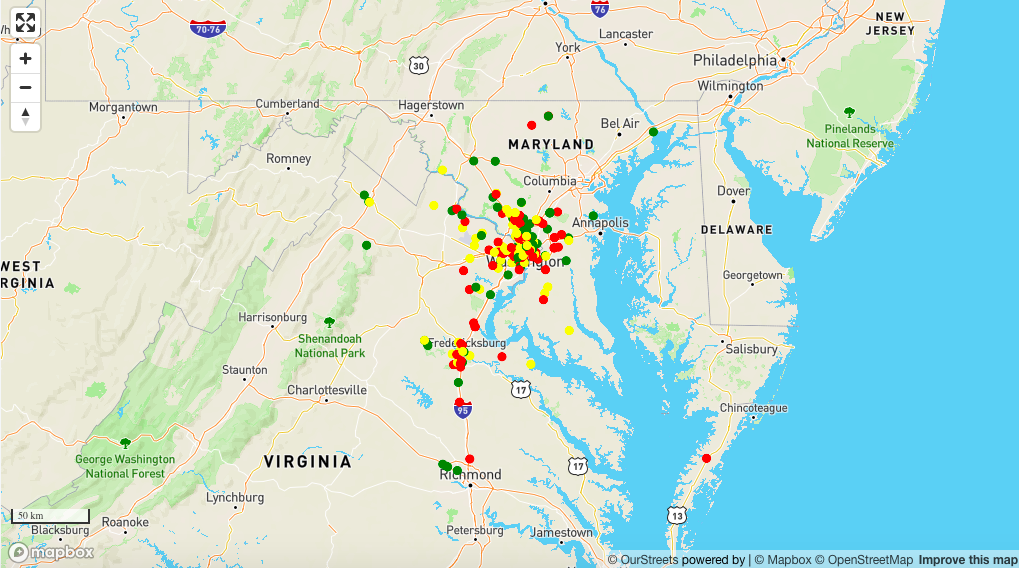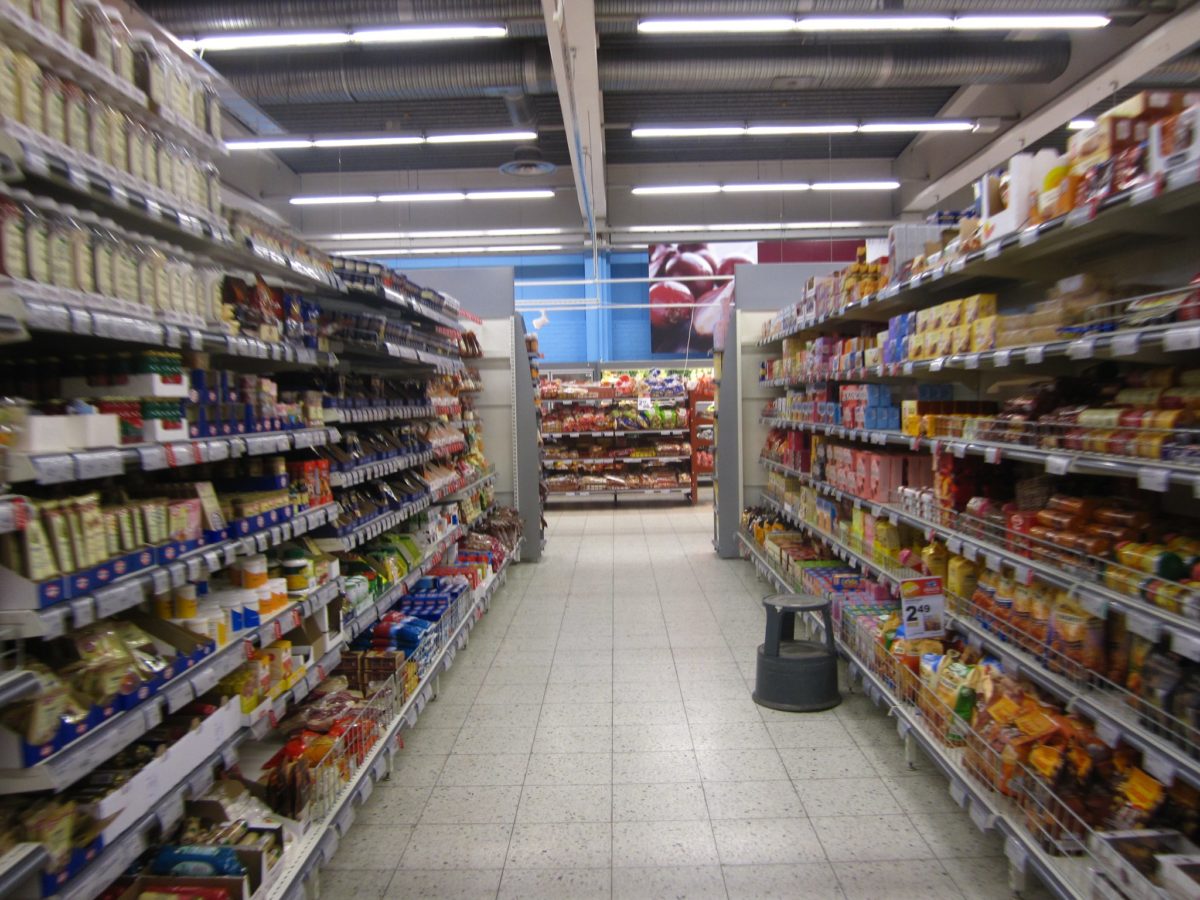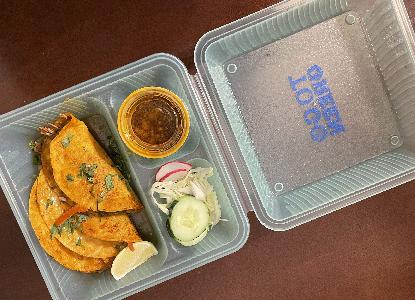Wharf-based startup OurStreets planned to launch its tech solution this spring, but those plans changed when the COVID-19 pandemic hit.
OurStreets was founded in January 2019 as part of the GigabitDCx challenge hosted by the Office of the Chief Technology Office. Cofounders Mark Sussman and Daniel Schep received an honorable mention for their app solution and were awarded $9,000 to advance their product — a web app that crowdsources momentary dangerous driving behavior like blocking bike lanes and cross walks, aggressive driving, etc.
Sussman told Technical.ly that the startup collected nearly 18,000 submissions as part of a beta test in the D.C. area. Originally named How’s My Driving?, the company did a soft launch of its app in January for Android and iOS users under its new name, OurStreets.
But as area residents continue to stock up on essential supplies as the pandemic progresses, OurStreets has temporarily pivoted its focus to launch OurStreets Supplies, a crowdsourcing platform for grocery and convenience stores.
“We got a call from the District of Columbia Department of Public Works the Friday before last asking if we could repurpose OurStreets to crowdsource the availability of essential supplies during the COVID-19 crisis,” Sussman said. “We of course said yes and realized quickly that this needed to be a nationwide effort, so we got to work and launched the update to OurStreets on Android and iOS this past week.”
For now, information in the app is 100% crowdsourced, so folks need to report inventory levels for the tool to be effective. Sussman said the company is working to incorporate inventory data from retailers, but so far that has been difficult acquire. Either way, the platform will be free for users and free to retailers interested in reporting their inventory levels for at least the next 60 days.
OurStreets Supplies has seen more than 800 reports from users in the first 60 hours of being live across 26 states, with most reports coming from the DMV region.
“We’re going to have to sustain this effort somehow and we’re figuring out those options now looking at both institutional and philanthropic capital, as well as potentially government funding,” Sussman said.
Since the company launched OurStreets Supplies, it has seen more than 800 reports from users in the first 60 hours of being live across 26 states, with most reports coming from the DMV region, according to the cofounder. To help validate the data being entered, OurStreets has teamed up with Thomas Circle-based Data Society to lead fact-checking efforts, among other partnerships.
“We’re partnering with Data Society to provide all the important data validation and data science work to start predicting inventory levels and ingest inventory data from retailers,” Sussman said. “We’re also partnering with [Ivy City-based food business accelerator] Union Kitchen to provide us with the retail expertise to understand how best to build this product.”
OurStreets has a five-person team comprised of its cofounders and three full-timers. Sussman shared that during this time, the team is working from home and gained a dozen volunteers helping primarily with software development for OurStreets Supplies. The company has a robust infrastructure already set up using AWS for its data warehousing as well as built a ticketing system for micromobility issue reporting.
“For example, if someone reports no toilet paper at Safeway, the manager of the store would have backend access to those reports and be able to resolve the ticket when a new shipment arrives and all that data would be fed to the in-app inventory search and our public facing map on our website,” he said.
The company made this pivot to OurStreets Supplies in just two weeks, according to the cofounder. The public facing map launched on its site today:

OurStreets Supplies’ public map of stores featured in its system. (Screenshot)
While OurStreets is running the supplies platform, Sussman said the company is still developing its original app functionality to promote safe driving.
“All original functionality of the app is still intact within OurStreets and we are continuing to work forward toward establishing relationships with cities, advocacy organizations and B2B partners,” he said. “Street safety isn’t going to be solved when this pandemic is over. If anything, COVID-19 has highlighted how unevenly space is allocated to pedestrians, cyclists and scootists, as compared to cars.”
OurStreets also recently launched a pilot with Skip and Helbiz to act as the universal app for reporting of micromobility issues like scooters blocking bike lanes. The company is working on building partnerships with municipalities to use OurStreets data in aggregate to aid strategic enforcement and street safety infrastructure planning.
Before you go...
Please consider supporting Technical.ly to keep our independent journalism strong. Unlike most business-focused media outlets, we don’t have a paywall. Instead, we count on your personal and organizational support.
3 ways to support our work:- Contribute to the Journalism Fund. Charitable giving ensures our information remains free and accessible for residents to discover workforce programs and entrepreneurship pathways. This includes philanthropic grants and individual tax-deductible donations from readers like you.
- Use our Preferred Partners. Our directory of vetted providers offers high-quality recommendations for services our readers need, and each referral supports our journalism.
- Use our services. If you need entrepreneurs and tech leaders to buy your services, are seeking technologists to hire or want more professionals to know about your ecosystem, Technical.ly has the biggest and most engaged audience in the mid-Atlantic. We help companies tell their stories and answer big questions to meet and serve our community.
Join our growing Slack community
Join 5,000 tech professionals and entrepreneurs in our community Slack today!






